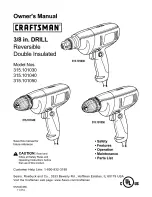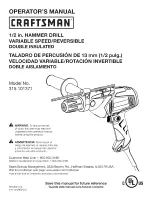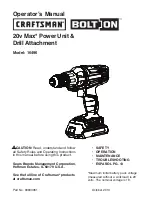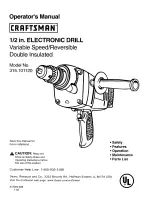
27
TIPS & TRICKS FOR
GRILLING SUCCESS
Choose a Proper Location to Grill
• Only use this grill outdoors in a well-ventilated
area. Do not use in a garage, building,
breezeway, or any other enclosed area.
• Keep the grill on a secure, level surface at all
times.
• Do not use grill within two feet of any
combustible material. Combustible materials
include, but are not limited to, wood or treated
wood decks, patios, and porches.
Preheat the Grill
Preheating your grill is a key factor when grilling
both directly and indirectly; though should not
be done before smoking. With all of the charcoal
glowing red, the temperature under the lid should
reach 500˚F after 7-10 minutes. The heat loosens
pieces of food stuck to the grate, making it easy to
brush off with a stainless steel bristle grill brush.
Preheating also gets the grate hot enough to sear
properly and helps prevent food from sticking to
the grate.
Wear Gloves
Always wear barbecue mitts when using your
charcoal grill. Vents, dampers, handles, and the
bowl will all get hot during the grilling process,
so be sure to keep your hands and forearms
protected.
No Ignition Fuel, No Problem
If the fuel tank is empty, or running on low, you
may also light your grill manually, as you would
any other charcoal grill. WEBER recommends using
a chimney starter (sold separately) and lighter
cubes (sold separately) to ignite charcoal manually.
Refrain from using lighter fluid as it is messy and
can transmit a chemical taste to your food.
Oil the Food, Not the Grate
Lightly oiling your food adds flavor and moisture,
while also preventing the food from sticking to the
grate. We do not recommend oiling the grate, as
this could cause unnecessary flare-ups.
Put a Lid On It
Keep the lid closed as much as possible for these
reasons:
1. Keeps the grate hot enough to sear the food
when cooking directly.
2. Traps the smokiness that develops when fat and
juices vaporize in the grill.
3. Prevents flare-ups by limiting oxygen.
Diffuser Plate Do’s and Don’ts
When smoking, the diffuser plate helps to maintain
consistent low temperatures and redirects the heat
and smoke around the food. However, the diffuser
plate can also be used when cooking indirectly to
maximize cooking space. Never put food or fuel on
the diffuser plate.
Tame the Flame
Flare-ups happen, which is typically good because
the flames sear the surface of the food. However,
too many flare-ups can cause the food to burn.
Keeping the lid closed as much as possible limits
the amount of oxygen inside the grill, which will
help extinguish any flare-ups. If the flames become
out of control, temporarily move the food over
indirect heat until they die down.
Watch the Time and Temperature
Grilling in a colder climate or higher altitude will
extend your cooking time. Hard blowing wind will
raise the grill’s temperature.
Keep It Clean
Follow the basic routine maintenance instructions
to keep your grill looking and grilling better for
years to come. Be sure to remove accumulated
ashes and old charcoal from the bottom of the
kettle and the ash catcher before every use.
Smoking with Wood
Experimenting with different woods while smoking
is encouraged to find the perfect balance of sweet
and savory. While smoking over long periods of
time, be sure to always use wood chunks instead of
wood chips. Chunks allow for a longer smoke that
penetrates slowly over a long cooking time. Wood
chips work best for a shorter cooking time because
they do not last as long during a long smoke.
Charcoal Quantity for Smoking & Cooking Times
Weight
Cooking Time
Charcoal Briquettes
Wood Chunks
FISH
1 lb to 3 lb
(0.45 - 1.36 kg)
1 to 2½ hours
60 to 80 briquettes (1¾ cups)
2 to 4
3 lb to 6 lb
(1.36 - 2.7 kg)
2½ to 4 hours
60 to 80 briquettes (1¾ cups)
2 to 4
POUL
TR
Y
2 lb to 3 lb
(0.9 - 1.36 kg)
2 to 3½ hours
60 to 80 briquettes (1¾ cups)
1 to 3
4 lb to 8 lb
(1.81 - 3.62 kg)
3½ to 4 hours
80 to 100 briquettes (2¼ cups)
2 to 4
8 lb to 12 lb
(3.62 - 5.44 kg)
4 to 5 hours
80 to 100 briquettes (2¼ cups)
3 to 4
12 lb to 18 lb
(5.44 - 8.1 kg)
8 to 10 hours
100 to 120 briquettes (2¾ cups)
3 to 5
PORK
4 lb to 8 lb
(1.81 - 3.62 kg)
5 to 8 hours
80 to 100 briquettes (2¼ cups)
3 to 4
8 lb to 12 lb
(3.62 - 5.44 kg)
8 to 12 hours
100 to 120 briquettes (2¾ cups)
3 to 5
BEEF
4 lb to 8 lb
(1.81 - 3.62 kg)
7 to 12 hours
80 to 120 briquettes (2½ cups)
3 to 5
8 lb to 12 lb
(3.62 - 5.44 kg)
12 to 18 hours
120 to 140 briquettes (3¼ cups)
3 to 5
Cooking times for beef use the USDA’s definition of medium doneness. Cooking times listed are for foods
that have been completely thawed. The weights, charcoal quantities, and cooking times are meant to be
guidelines rather than hard and fast rules. Factors such as altitude, wind, and outside temperature can
affect cooking times.
m
WARNING: Never use charcoal impregnated with charcoal lighter fluid.
Wood Flavors for Smoking
Wood Flavor
Characteristics
Pairs With
Apple
SUBTLE
Slightly sweet
with a dense,
fruity smoke
flavor
Fish
Poultry
Pork
(particularly ham)
Vegetables
Cherry
SUBTLE
Slightly sweet
with a fruity
smoke flavor
Fish
Poultry
Pork
Vegetables
Hickory
RICH
Pungent and
smoky with a
bacon-like flavor
Poultry
Pork
Beef
Beech
SUBTLE
Delicate with a
mildly smoky
flavor
Fish
Poultry
Pork
Lamb
Vegetables
Pecan
RICH
Pungent with a
sweet flavor.
Ideal for smoking
at a very low
heat.
Fish
Poultry
Pork
Lamb
Beef
Mesquite
BOLD
Big, bold smoke
flavor with a
borderline bitter
finish.
Pork
Lamb
Beef
GRILLING METHODS - SMOKING
Summary of Contents for Summit Kamado S6
Page 4: ...4 1 1 1 1 2 3 1 1 1 1 1 1 1 1 1 1 2 2 2 ASSEMBLY ENSAMBLAJE ASSEMBLAGE ...
Page 6: ...6 x2 1 3 2 2 ASSEMBLY ENSAMBLAJE ASSEMBLAGE ...
Page 7: ...7 X 2 4 5 3 2 ASSEMBLY ENSAMBLAJE ASSEMBLAGE ...
Page 8: ...8 6 7 8 9 10 2 2 2 2 4 ASSEMBLY ENSAMBLAJE ASSEMBLAGE ...
Page 9: ...9 12 11 13 3 ASSEMBLY ENSAMBLAJE ASSEMBLAGE ...
Page 10: ...10 14 15 ASSEMBLY ENSAMBLAJE ASSEMBLAGE ...
Page 14: ...14 22 23 24 2 ASSEMBLY ENSAMBLAJE ASSEMBLAGE ...
















































